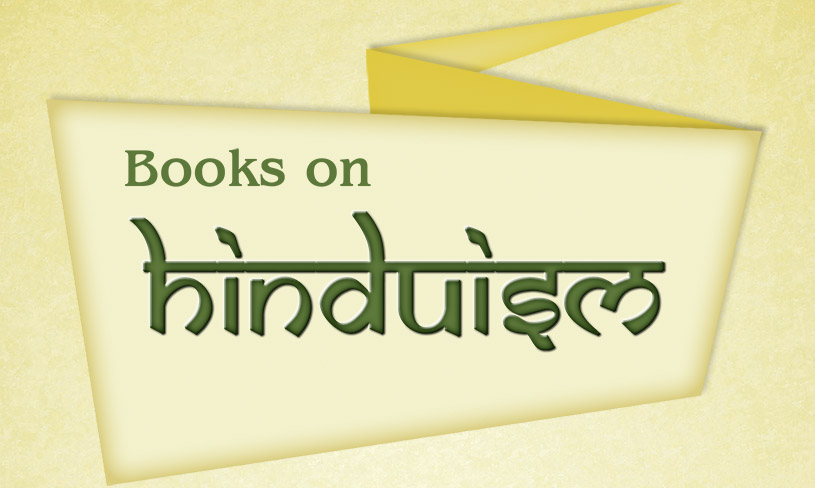 |
| In honor of Hindu Heritage Month (as celebrated in the state of Florida), this issue presents readers with a listing of varied titles to inform, engage, and enlighten the spiritual mind! |
The Nay Science
by Vishwa Adluri and Joydeep Bagchee |
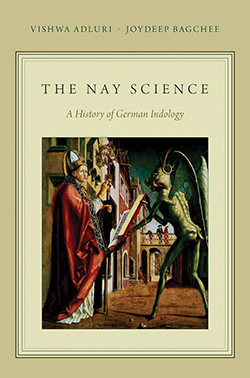 The Nay Science offers a new perspective on the problem of scientific method in the human sciences. Taking German Indological scholarship on the Mahabharata and the Bhagavad Gita as their example, Adluri and Bagchee develop a critique of the modern valorization of method over truth in the humanities. The authors show how, from its origins in eighteenth-century Neo-Protestantism onwards, the critical method was used as a way of making theological claims against rival philosophical and/or religious traditions. Via discussions of German Romanticism, the pantheism controversy, scientific positivism, and empiricism, they show how theological concerns dominated German scholarship on the Indian texts. Indology functions as a test case for wider concerns: the rise of historicism, the displacement of philosophical concerns from thinking, and the belief in the ability of a technical method to produce truth. The Nay Science offers a new perspective on the problem of scientific method in the human sciences. Taking German Indological scholarship on the Mahabharata and the Bhagavad Gita as their example, Adluri and Bagchee develop a critique of the modern valorization of method over truth in the humanities. The authors show how, from its origins in eighteenth-century Neo-Protestantism onwards, the critical method was used as a way of making theological claims against rival philosophical and/or religious traditions. Via discussions of German Romanticism, the pantheism controversy, scientific positivism, and empiricism, they show how theological concerns dominated German scholarship on the Indian texts. Indology functions as a test case for wider concerns: the rise of historicism, the displacement of philosophical concerns from thinking, and the belief in the ability of a technical method to produce truth.
Based on the historical evidence of the first part of the book, Adluri and Bagchee make a case in the second part for going beyond both the critical pretensions of modern academic scholarship and the objections of its post-structuralist or post-Orientalist critics. By contrasting German Indology with Plato’s concern for virtue and Gandhi’s focus on praxis, the authors argue for a conception of the humanities as a dialogue between the ancients and moderns and between eastern and western cultures. |
|
|
A Hindu Theology of Liberation
by Anantanand Rambachan |
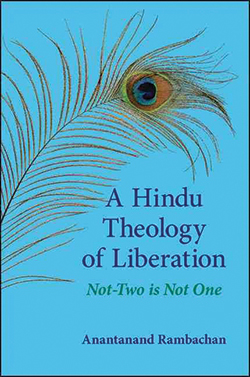 This expansive and accessible work provides an introduction to the Hindu tradition of Advaita Vedānta and brings it into discussion with contemporary concerns. Advaita, the non-dual school of Indian philosophy and spirituality associated with Śaṅkara, is often seen as “other-worldly,” regarding the world as an illusion. Anantanand Rambachan has played a central role in presenting a more authentic Advaita, one that reveals how Advaita is positive about the here and now. The first part of the book presents the hermeneutics and spirituality of Advaita, using textual sources, classical commentary, and modern scholarship. The book’s second section considers the implications of Advaita for ethical and social challenges: patriarchy, homophobia, ecological crisis, child abuse, and inequality. Rambachan establishes how Advaita’s non-dual understanding of reality provides the ground for social activism and the values that advocate for justice, dignity, and the equality of human beings. This expansive and accessible work provides an introduction to the Hindu tradition of Advaita Vedānta and brings it into discussion with contemporary concerns. Advaita, the non-dual school of Indian philosophy and spirituality associated with Śaṅkara, is often seen as “other-worldly,” regarding the world as an illusion. Anantanand Rambachan has played a central role in presenting a more authentic Advaita, one that reveals how Advaita is positive about the here and now. The first part of the book presents the hermeneutics and spirituality of Advaita, using textual sources, classical commentary, and modern scholarship. The book’s second section considers the implications of Advaita for ethical and social challenges: patriarchy, homophobia, ecological crisis, child abuse, and inequality. Rambachan establishes how Advaita’s non-dual understanding of reality provides the ground for social activism and the values that advocate for justice, dignity, and the equality of human beings. |
|
|
The Complete Works of Swami Vivekananda
by Swami Vivekananda |
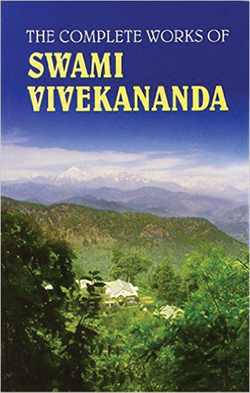
Swami Vivekananda is regarded in India as a patriot and saint. He came to the United States and spoke at the World’s Parliament of Religion in Chicago.
After the Parliament, the Swami traveled throughout the United States and England lecturing and giving the Western world his best teachings on Vedanta, teachings that seemed customized for the particular needs of the western mind. His first book on the yoga of meditation was assembled and published as Raja Yoga. Later came out a collection of his talks on the intellectually demanding approach Jnana Yoga, and finally, talks on the yoga approaches that suit most people Karma and Bhakti Yoga. A series of private talks to his most serious students at Thousand Islands Park in New York was later published as Inspired Talks.
This 8-volume collection brings his varied works and life-giving message to a broad audience.
|
|
|
The Holy Gita
Commentary by Swami Chinmayananda
|
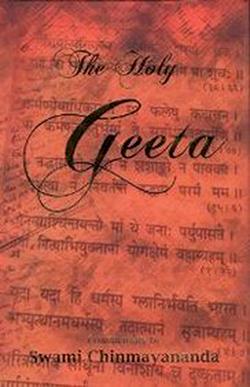 With his own brand of wit, humor and vocabulary, Swami Chinmayananda paints vividly the wisdom of the ages in front of us. His commentary on the Bhagavad-Gita is considered one of the best ever. Also his commentaries on the Upanishads are outstanding for their clarity and crisp logic. He is well-known for his books Kindle Life, a Fundamental text of Vedanta well-known widely popular for its simplicity and thought-provoking examples and Art of Man-making, which conveys the essence of the Gita for the younger generation inspiring them to live a life of higher ideal and purpose. In his book Art of God-symbolism he shatters the age old myths, rendering a new perspective to God-symbolism. With his own brand of wit, humor and vocabulary, Swami Chinmayananda paints vividly the wisdom of the ages in front of us. His commentary on the Bhagavad-Gita is considered one of the best ever. Also his commentaries on the Upanishads are outstanding for their clarity and crisp logic. He is well-known for his books Kindle Life, a Fundamental text of Vedanta well-known widely popular for its simplicity and thought-provoking examples and Art of Man-making, which conveys the essence of the Gita for the younger generation inspiring them to live a life of higher ideal and purpose. In his book Art of God-symbolism he shatters the age old myths, rendering a new perspective to God-symbolism. |
|
|
Rearming Hinduism: Nature Hinduphobia and
the Return of Indian Intelligence
by Vamsee Juluri |
|
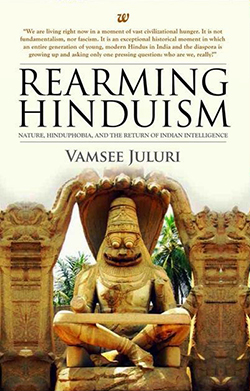 Through an astute and devastating critique of Hinduphobia in today’s academia, media and popular culture, Vamsee Juluri shows us that what the Hinduphobic worldview denies virulently is not only the truth and elegance of Hindu thought, but the very integrity and sanctity of the natural world itself. Through an astute and devastating critique of Hinduphobia in today’s academia, media and popular culture, Vamsee Juluri shows us that what the Hinduphobic worldview denies virulently is not only the truth and elegance of Hindu thought, but the very integrity and sanctity of the natural world itself.
By boldly challenging some of the media age’s most popular beliefs about nature, history, and pre-history along with the Hinduphobes’ usual myths about Aryans, invasions, and blood-sacrifices, Rearming Hinduism links Hinduphobia and its hubris to a predatory and self-destructive culture that perhaps only a renewed Hindu sensibility can effectively oppose. It is a call to see the present in a way that elevates our desa and kala to the ideals of the sanathana dharma once again.
|
|
|
Chronology of Hinduism
by Raj Shah |
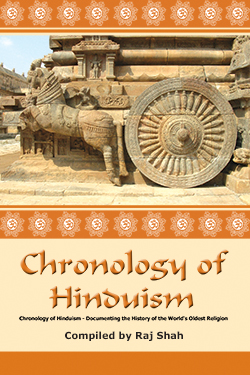 Chronology of Hinduism highlights the rich history of the Hindu religion dating over 10,000 years. For decades, scholars have been telling the world that Aryans invaded India and brought ideas and human civilization to the world. While documenting the vast history of the Hindu religion, this book also examines the Aryan invasion and explains how the Aryan invasion never really took place. A must-read for all Hindus, especially Hindu teenagers and young adults, as they will be the ones to carry traditions and religious beliefs forward. Chronology of Hinduism highlights the rich history of the Hindu religion dating over 10,000 years. For decades, scholars have been telling the world that Aryans invaded India and brought ideas and human civilization to the world. While documenting the vast history of the Hindu religion, this book also examines the Aryan invasion and explains how the Aryan invasion never really took place. A must-read for all Hindus, especially Hindu teenagers and young adults, as they will be the ones to carry traditions and religious beliefs forward. |
|
|

